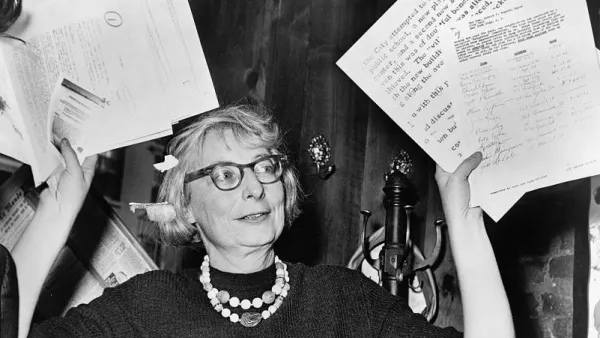Could the Los Angeles River use its own 'power broker'?
With the legacies of Robert Moses and Frederick Law Olmsted recently under discussion, Sam Hall Kaplan joins the conversation—offering a rich overview of Moses' work along with colorful anecdotes from their personal interactions. He then draws on the lessons of these two planning giants to explore major developments around Los Angeles River revitalization.
Kaplan explains, "With a bombastic glee, Moses arbitrarily imposed priorities, bent budgets, denigrated opponents, and expedited contracts. The banks and labor unions loved him. Politicians feared him. And communities hated him. He never learned to drive, preferring to be chauffeured. But if he had a favored vehicle, it was the bulldozer, as anyone standing in his way can attest. Public accountability and transparency were not common pursuits in the Depression and quarter century following, when Moses transformed New York City and state."
Despite this reputation, Kaplan wonders whether the Los Angeles River might need a personality equally able to get things done. He gives readers a sense of the "many public and private interests wading in the 51-mile course of the river," speaking with certain key figures to demonstrate the sheer number of projects and agendas at work. Given the Army Corps of Engineers' recent decision to recommend the $1.08-billion Alternative 20, promising habitat restoration and recreation for 11 miles of the waterway, Los Angeles faces the daunting task of organizing these multi-faceted efforts.
Kaplan concludes with a telling story: "I remember too well a community hearing nearly a decade ago for a particularly ambitious mixed-use school, parks and, housing project edging the river in Cypress Park... No one spoke out for housing, jobs, or a river promenade. This prompted an observer, when leaving, to confront the presumably pro-river councilman and loudly comment, 'Less consensus and more "cojones" would have been welcome.' It was a phrase that would have pleased Robert Moses and his champions."
A planner, writer, and academic, Kaplan has worked as both a design critic for the Los Angeles Times and an urban affairs reporter for the New York Times, along with teaching at Art Center College of Design, Yale, and Princeton. This exclusive article for The Planning Report reflects the writer's own opinions and research.
FULL STORY: Moses and the Future of the LA River

Planetizen Federal Action Tracker
A weekly monitor of how Trump’s orders and actions are impacting planners and planning in America.

Chicago’s Ghost Rails
Just beneath the surface of the modern city lie the remnants of its expansive early 20th-century streetcar system.

Amtrak Cutting Jobs, Funding to High-Speed Rail
The agency plans to cut 10 percent of its workforce and has confirmed it will not fund new high-speed rail projects.

Ohio Forces Data Centers to Prepay for Power
Utilities are calling on states to hold data center operators responsible for new energy demands to prevent leaving consumers on the hook for their bills.

MARTA CEO Steps Down Amid Citizenship Concerns
MARTA’s board announced Thursday that its chief, who is from Canada, is resigning due to questions about his immigration status.

Silicon Valley ‘Bike Superhighway’ Awarded $14M State Grant
A Caltrans grant brings the 10-mile Central Bikeway project connecting Santa Clara and East San Jose closer to fruition.
Urban Design for Planners 1: Software Tools
This six-course series explores essential urban design concepts using open source software and equips planners with the tools they need to participate fully in the urban design process.
Planning for Universal Design
Learn the tools for implementing Universal Design in planning regulations.
Caltrans
City of Fort Worth
Mpact (founded as Rail~Volution)
City of Camden Redevelopment Agency
City of Astoria
City of Portland
City of Laramie



























